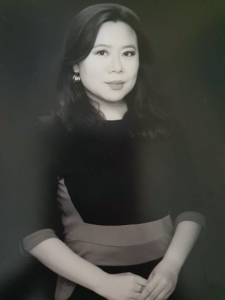
Menu
「Hear Her Voice」- 2: China, A personal journey
China, A personal journey
[The theme of the second phase of “Hear Her Voice” is “China, A personal journey”, hosted by Huang Xinyao. Guest Lin Yue talked about how to define China, the history of China in recent years, and the future from the three questions of What, When and Why. She discussed the development of China, cultural differences at the individual and collective levels and the changes in the development of individuals. The guest and host introduction and content of this speech sharing session are as follows.]
Guest:Lin Yue
Lin Yue is an Executive Director at Goldman Sachs Asset Management in London. She is responsible for growing and managing key relationships across UK institutional investors.
As one of the senior executives of mainland Chinese origin in the City of London, she has helped elevate women and ethnic minorities in the workplace. She is a thought leader on Diversity & Inclusion, workplace cultures, leadership and decoding differences between China and the West – her insights and speeches are widely sought for their unique perspectives, originality and passion.
Lin has been honoured on many occasions for her work. She was recognized as HERoes 100 Women Future Leaders List in 2020, as a top 5 Future Leaders for HERoes Women Role Model , on Brummell’s list as one of 50 most inspirational women in the City of London, one of the 50 Ethnic Minority Future Leaders by EMpower, and the winner of the “Excellence in Banking” award at the Chinese Business Leaders Awards.
A graduate of Experimental Psychology from Oxford University, Lin is also passionate about applying psychology at workplace and beyond and making life skills accessible to all.

Host: Huang Xinyao
Xinyao is a senior investment analyst, managing fixed income portfolios at Western Asset Management. A CFA and FRM charter holder, she is a CFA Digest Abstractor and a member of CFA UK Structured Learning Committee. She has a strong academic interest and teaches at universities as a visiting lecturer.
A CFA and FRM charter holder, she earned her master’s degree in Edinburgh University and graduated from Newcastle University. She is a mother of two, enjoys reading, playing badminton, running and learning from new life experiences.

1. What defines China?
What defines China? When it comes to China, the sheer scale of the country can be difficult to comprehend. Geographically, the area size is similar to the US, with 1.4 billion people, of which 400 million are millennials. There were some recent Wall Street Journal surveys asking which country will be the next superpower. 70% of Americans think it’s China, but less than half of Chinese people think this. Another study in China asked Chinese young people, given the choice, would you still want to live in China. Around close to 40% said no. If China is already so powerful, why don’t they want to live in the most dynamic economy in the world? There is a key fact here to play that is paradox of GDP versus GDP per capital. China is a powerful state on the aggregate level, but remains a developing country on the individual basis. The GDP per capital figure represents what people live on a day to day basis. For example, less than 7% of Chinese people actually have a passport and the chart of visa-free travel shows that China is only slightly better than North Korea, Iran, Afghanistan. Of course, there are diplomatic reciprocal rules here, but it do not change the main message, being the second largest economy has really translated into a lot of real power for Chinese citizens, however, on the basis of GDP per capital basis there is still a long way to go.
2. China’s recent past and present
Have a look at China’s recent past and exciting present, and you will see a huge generational difference between the older generation and Chinese Millennials. The connection with the West really shape how China’s citizens ultimately viewed the West. Another key feature is the one child policy. The family structure changed with the one child policy, which created a structure, of four grandparents, two parents and a single child. Many argued that the children became little emperors in the family. However, being the little emperors brings a big price to pay, the huge expectation to succeed. Not only do what they can support their own life, but also for parent’s life. So, the last point is competition, whereby every parent is doing pretty much the same thing. We grew up in a very competitive environment. Each year, ten million people compete in the entrance exam for 10,000 seats at top universities. The competition is high.
3. Outlook for life
And because of our life experiences, we have a radically different outlook of life than previous generations. Today over 300 million Chinese learn and speak English. Most people believe that success in English retention means success in life. This access to the world also means they are having more interaction with people from the West which naturally changes their attitude of the world. For example, when asked about same sex marriage, 70% of Chinese millennials support it, which is a very similar number to the US. Secondly, the outlook of Chinese Millennials is much more optimistic. Imagine that every day of your life, seems to be better than yesterday. This is a common feeling throughout their lives. We hope our lives keep improving, and become as similar as possible to the lives of middle class in developed countries wish. There is a strong sense on the ground in China Beijing is about to arrive on the world stage in a big way.
4. Explaining the cultural differences
As a Chinese living in the West, we face a very interesting transition from one of the 1.4 billion people to a minority in the UK, how different we are perceived. Lin is a Chinese person work in finance, she was thought that she must be very good at math. Then she realized that sometimes people thought she was a Ping Pong experts. It was just staggering. She knew nothing about this sport. That is so culturally distinct.
5. Cultural differences below the iceberg